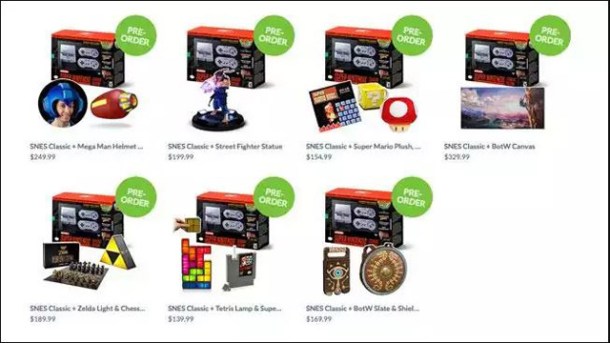Views and opinions expressed in this piece are those of the author and do not represent oprainfall as a whole.
Based on last month’s frenzy over the Super NES Classic Edition, retailer GameStop will be sticking with their model of extravagant, high priced bundles. Speaking with Glixel, the company’s senior director of merchandising Eric Bright believes these pricey bundles offers a convenience to consumers. “We make it more convenient. We put some items in the bundle from ThinkGeek.Com, retro items that would appeal to those buyers,” he said.
“Customers have the opportunity to come into our stores and choose the accessories that they would like to bundle with their hardware, or buy online the pre-determined bundles we have put together to help make the shopping experience more convenient.”
Despite what Mr. Bright says, let’s talk about the real reason why there are bundles like this.
If you missed out or are behind the curve, pre-orders for the micro console went live on August 22nd across a span of retailers, selling out instantly and upsetting many potential customers. GameStop offered their pre-orders in two flavors: either walk-ins for the $80 standalone unit, or, in the interest of this article, in online bundles featuring merch courtesy of their ThinkGeek brand upwards of $330.
The real purpose of these forced bundles is selling unsold stock of inventory merchandise. ThinkGeek is owned by GameStop. They didn’t purchase the toy company for $140 million for nothing. Video game hardware may still sell there, but in light of falling video game software, selling extra product is a way to cushion falling financial results. These SNES Classic bundles let them have their cake and eat it, selling hardware via brick-and-mortar while pushing product from the sister company they bought for a lot of money.
None of the complaints matter as it were. The Super NES Classic bundles and other of the same kin sell out. “We went through a lot of pain and effort to make sure we could service our online customers. It wasn’t perfect, but it did allow us to sell out of our initial allotment within minutes,” Eric explained.

This wouldn’t be the first time, either. A few months ago they just happened to have extra NES Classics lying around that they just happened to sell in bundles for inflated prices, after Nintendo happened to announce they were discontinued worldwide. The concept of forced bundles go back by decades, with popular consoles like the PlayStation 2 back at its 2000 launch, and people happily paid for the hot new thing.
Some forced bundles do include useful things, like software and controllers. It’s the case with the other Nintendo hardware GameStop has been pushing hard: the Switch. In the same interview, Eric Bright was quick to note the rapid fire sales of the console within GameStop, one of the reasons the Switch is also in variable bundles. Switch bundles aren’t as bad as the Super NES Classic ones, as they include practical things like extra controllers, games, and a carry case or controller charger base.
The one good thing these bundles can attempt to do is fight scalpers, but at its core these are anti-consumer. Did you really need that Tetris puzzle or a Triforce lamp to go with the thing you actually wanted to buy? Oh, and you can’t return those extra items for a refund, either. Profits sit above consumer friendliness.





